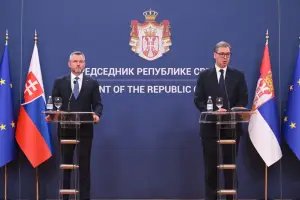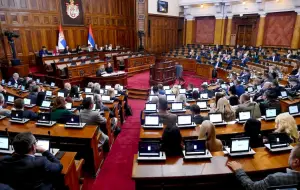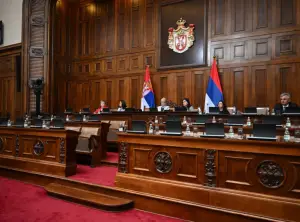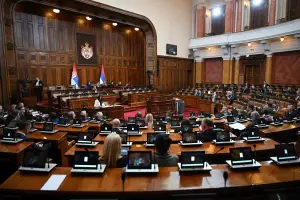- Serbia
Get to know Serbia
- Citizens
Culture and science
Health services
Pension and disability insurance
- Business
Employment
Economy
- Media
- Government
- Contact
Keep in touch
Contact form
Back
Keepin touch
Whether you have a question, comment, suggestion or any problem in the purview of the government, send us your message and we will try to respond as soon as possible. If your problem is not in our purview, we will forward your message to the relevant institution.
Q:
A:
Parliament adopts amendments to Law on public information
Belgrade,
31 August 2009
Serbian Parliament today adopted the bill on amendments to the Law on public information with 125 MPs, out of the 225 present, voting in favour of the bill.
Eighty-eight MPs voted against it, 11 abstained from voting and one MP did not vote at all.
Parliament also adopted the bill on culture that will create a framework for improving the position of everyone in this sector through clearly defined rights, obligations and responsibilities of the state, autonomous provinces and local self-government units.
It passed amendments to the Law on the execution of prison sentences, specifying the work of certain services within prisons.
The Parliament also adopted amendments to the Law on the organisation and jurisdiction of state organs in suppressing organised crime in which acts of corruption committed by top state officials are now defined as organised crime.
The law on cooperation with the International Criminal Court (ICC) was passed, which establishes that a person sentenced by the ICC or a court in Serbia cannot be tried again for the same crime.
Parliament also passed amendments to the Penal Code, according to which a protected witness can be indicted and which also establishes the plea bargaining process.
The bill on the enforcement of penal sanctions for organised crime was also passed, according to which those sentenced for organised crime will serve their sentences in special prison units.
MPs today adopted amendments to the Law on money laundering and financing terrorism, the Law on textbooks and teaching aids, the Law on the bases of the educational system and the Law on planning and construction.
Parliament also adopted the bill on culture that will create a framework for improving the position of everyone in this sector through clearly defined rights, obligations and responsibilities of the state, autonomous provinces and local self-government units.
It passed amendments to the Law on the execution of prison sentences, specifying the work of certain services within prisons.
The Parliament also adopted amendments to the Law on the organisation and jurisdiction of state organs in suppressing organised crime in which acts of corruption committed by top state officials are now defined as organised crime.
The law on cooperation with the International Criminal Court (ICC) was passed, which establishes that a person sentenced by the ICC or a court in Serbia cannot be tried again for the same crime.
Parliament also passed amendments to the Penal Code, according to which a protected witness can be indicted and which also establishes the plea bargaining process.
The bill on the enforcement of penal sanctions for organised crime was also passed, according to which those sentenced for organised crime will serve their sentences in special prison units.
MPs today adopted amendments to the Law on money laundering and financing terrorism, the Law on textbooks and teaching aids, the Law on the bases of the educational system and the Law on planning and construction.
-
 Belgrade, 4 January 2026
Belgrade, 4 January 2026Violation of UN Charter has become dominant principle of contemporary politics
-
 Belgrade, 21 December 2025
Belgrade, 21 December 2025Strengthening cooperation with Slovakia in many areas
-
 Belgrade, 21 December 2025
Belgrade, 21 December 2025President of Slovakia ceremonially welcomed in front of Palace of Serbia
-
 Belgrade, 18 December 2025
Belgrade, 18 December 2025Vučić welcomes President of Georgia in front of Palace of Serbia
-
 Belgrade, 15 December 2025
Belgrade, 15 December 2025Serbia needs strong, stable education system
-
 Belgrade, 3 December 2025
Belgrade, 3 December 2025Parliament adopts 2026 budget
-
 Belgrade, 28 November 2025
Belgrade, 28 November 2025Serbian President welcomes President of DR Congo
-
 Belgrade, 7 November 2025
Belgrade, 7 November 2025Parliament adopts multiple laws
-
 Belgrade, 22 October 2025
Belgrade, 22 October 2025Parliament adopts several laws, ratifies multiple international agreements
-
 Belgrade, 15 October 2025
Belgrade, 15 October 2025Vučić welcomes Ursula von der Leyen in front of Palace of Serbia
